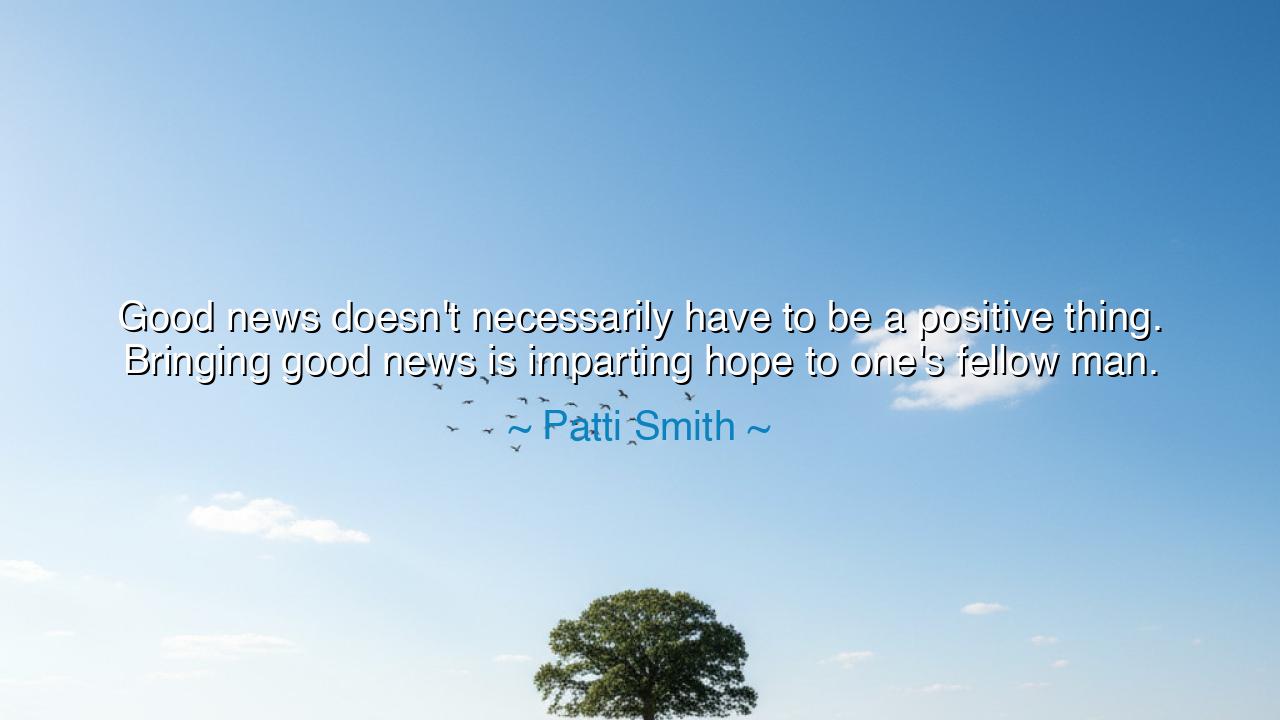
Good news doesn't necessarily have to be a positive thing.
Good news doesn't necessarily have to be a positive thing. Bringing good news is imparting hope to one's fellow man.






“Good news doesn’t necessarily have to be a positive thing. Bringing good news is imparting hope to one’s fellow man.” Thus spoke Patti Smith, the priestess of poetry and rock, whose voice has always been a bridge between anguish and transcendence. In these words, she offers not the shallow comfort of optimism, but the sacred duty of hope — that even amidst darkness, to speak truthfully, to carry light, is to bring good news. For to impart hope is not merely to celebrate what is easy or joyful, but to remind the weary that meaning can still be found, that life still moves, that even in ruin, there is a pulse of becoming.
Patti Smith came of age in a world trembling with uncertainty — the Vietnam War, social upheaval, and a generation’s loss of innocence. Her art was not born from comfort, but from confrontation with suffering, death, and rebirth. When she spoke these words, she was not referring to news as headlines or reports, but as revelation — the messages we deliver to one another in times of trial. In her understanding, to bring “good news” does not always mean bringing happiness, but bringing truth that restores faith. A friend who speaks honestly to a grieving heart brings good news; a poet who reminds the broken that beauty still breathes brings good news. For what is good if not that which strengthens the soul?
This understanding reaches back through the ages, to prophets and storytellers who bore tidings not of ease, but of awakening. Consider the story of the angel who visited Mary, bringing the message that she would bear a child destined for both glory and suffering. Was that news easy? No. Yet it was good, for it carried divine purpose and hope for humankind. So too did Patti Smith, in her art and her life, walk this same paradox — the conviction that the messenger of good news is not one who denies pain, but one who transforms it into meaning.
Her words find their echo in every age when hope seemed lost. Think of Winston Churchill, standing before his people as Europe burned in war. His words were not sweet, but stern: “I have nothing to offer but blood, toil, tears, and sweat.” And yet those words, born of realism and courage, were good news — for they reminded a broken people that they were not helpless. They still had strength, they still had will, they still had hope. This is what Patti Smith means: that the highest form of good news does not promise comfort, but rekindles the fire of endurance.
She calls us, then, to redefine goodness. In a world obsessed with cheerfulness and false positivity, Smith’s wisdom is a rebellion — a reminder that goodness is not the absence of sorrow, but the presence of light within it. A friend who tells you that you will not die alone, a stranger who listens to your story, a song that names your grief and turns it into melody — all these are acts of hope-giving. They do not erase pain, but they help carry it. And in this way, they fulfill the highest calling of the human heart: to remind one another that we are not alone.
There is something deeply heroic in this view. To bring good news is not to flatter or console with illusions; it is to speak with honesty and compassion when the world trembles. The poet, the leader, the friend — all who dare to tell truth while still invoking hope are bearers of light. They do not promise that suffering will vanish, but that meaning and love will survive it. Their words, like fire in a cold night, illuminate without denying the darkness. For hope is not the denial of pain — it is the decision to keep walking through it.
So, my child, learn from Patti Smith’s wisdom: be a bringer of good news, not in the shallow sense of comfort, but in the profound sense of hope. Speak truth even when it trembles; give strength even when your own voice quivers. When others despair, remind them that the story is not over. When they fall, lend them your belief that they can rise again. For in doing so, you become a torchbearer in a dark world — not by banishing shadows, but by showing that light still exists among them.
And remember this: good news is not always what pleases the ear — it is what uplifts the soul. When you impart hope, you become the messenger that every age has needed — the one who reminds humanity that even in the ashes, there is still a spark. Speak it, live it, share it — and let your words, like Patti Smith’s, become the music that awakens faith in the hearts of those who have forgotten how to believe.






AAdministratorAdministrator
Welcome, honored guests. Please leave a comment, we will respond soon